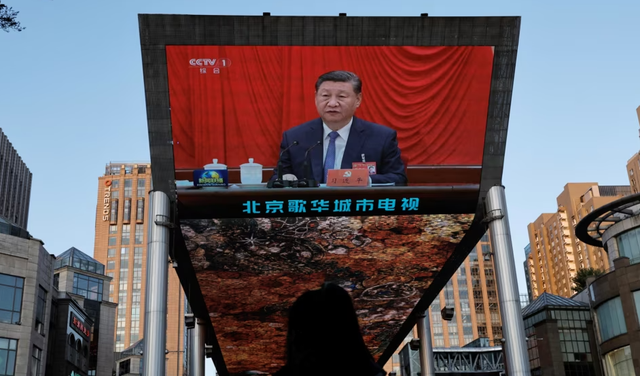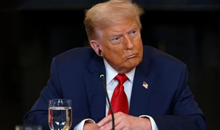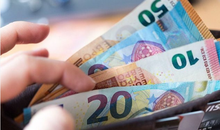
 Flash News
Flash News
The mystery of Renis Dobra's murder, the two main leads of the investigation are revealed
Rama's ultimatum: On Monday, all heads of administrative units must be dismissed
Fires in the country, 4 fires still active, what is the situation?
Rama targets Shkodra prosecutor again: Gjeli wrote philosophical essay with innocence of illegal construction
Wanted for theft, 26-year-old arrested in Durrës

A survey by the Pew Research Center shows that most people in the world understand China's economic influence on their countries, but they are divided on whether this influence is good or bad. As VOA correspondent Michael Baturin reports, the poll also finds that more people in the United States view China's economic influence negatively than people in other countries surveyed.
From San Francisco to New York and Washington, the influence of Chinese neighborhoods and culture can be seen in many American cities.
"I think it has a lot of influence. Look around, we are in the Chinatown neighborhood," says American Rain Brody.
“I think everyone likes Chinese food, like the Lunar Festival, Chinese New Year. So from a cultural point of view I think it's a very good influence," says Eugene Mosac, a visitor to Washington.
Although many Americans think that Chinese culture is a positive thing, when it comes to China's influence on the United States economy, the Pew Research Center survey found that nearly three-quarters of Americans have a negative perception.
The survey had a number of questions about China for people in 35 different countries, including the United States, says Laura Silver of the Pew Research Center.
"Where Americans really stand out is that they see most of China's influence as negative. In fact, more Americans say China's economic impact is negative than people in any other country we surveyed," she says.
China is one of the major importers of products into the United States, and several China-related digital sales companies, such as Shein and Temu, have expanded their operations here in the United States. Rain Brodie bought products from the Temu company.
"I think they offer products at really affordable prices," she says.
Although tempted by the low prices, Kendall Funasaki has not purchased products from these websites.
“Chinese sites like Temu have a negative effect on the consumer because they encourage people to buy many more items of poor quality, which the consumer then throws away. So, I think these companies drive unnecessary costs for consumers," she says.
In addition to some negative perceptions of companies linked to Chinese e-commerce, the US government has also warned against using the TikTok app, which is controlled by Beijing-based company ByteDance, said Christopher Tang, a business professor at the University of California, Los Angeles.
"The US government is concerned that TikTok could be used as a tool to spread fake news and biased views about candidates during election years," he says.
"I think Tiktok can be used as a way of personal expression and presentation. Each person has their own opinions. I think it could work either way," says Rain Brodie.
The Pew Research Center also found that there are differences in people's views on China's influence based on the age of the respondents.
"Older people are slightly more likely to say that China has a big influence and that this influence is negative. This is true for example in the United States," says Laura Silver of the Pew Research Center.
"The young generation likes Tiktok, Chinese products and the Shein company. They are less worried about the situation with China, so they see China in a relatively more positive light. But older generations still think about war. They think about global security issues. They are more concerned about China's influence. So I think the survey results were not surprising," says Christopher Tang of the University of California, Los Angeles.
The Pew Research Center survey findings are based on public perception and are not a real indication of the influence China has on the domestic economies of other countries. But it can be a useful tool, says Ms Silver.
"Public perceptions are likely to play a role in how politicians analyze things. So we think providing a voice to the public is an important service," she says.
A service that presidential candidates can use to attract more voters./ VOA
Latest news


Dervish's Irony: Why are 30 advisors few for a water supply director?
2025-07-11 11:58:20



Rama's ultimatum: On Monday, all heads of administrative units must be dismissed
2025-07-11 11:05:59
Fires in the country, 4 fires still active, what is the situation?
2025-07-11 10:56:23
Government irony: Rama strips Dredha of power, then demands law and order
2025-07-11 10:49:10
German media: Vlora Airport 'kills' one of Europe's largest wetlands!
2025-07-11 10:37:46

Amid the Alps in Theth, the law punishes even those who try to respect it
2025-07-11 10:14:16
Wanted for theft, 26-year-old arrested in Durrës
2025-07-11 10:03:29
After the dismissals, Rama gathers the mayors in Durrës
2025-07-11 09:42:29
Released on bail, Salianji appears before the Probation Service
2025-07-11 09:34:28

Haxhi Qamil Rama and the directors of the Municipalities!
2025-07-11 09:21:35
30 years since the Srebrenica massacre in Bosnia and Herzegovina
2025-07-11 09:10:52

From rhetoric to brandy, POLITICO: 9 things Nigel Farage can do in Albania
2025-07-11 08:53:35
Trump announces 35% tariffs on Canadian goods
2025-07-11 08:39:29
Foreign exchange, how much foreign currencies are sold and bought today
2025-07-11 08:24:25

Horoscope, what do the stars have in store for you today?
2025-07-11 07:59:39
Sun and high temperatures, weather forecast
2025-07-11 07:41:09
Morning Post/ In 2 lines: What mattered yesterday in Albania
2025-07-11 07:20:14
Zhupa: In Theth, some Austrian strategic investors want the empty area
2025-07-10 22:57:08
Malltezi: SPAK admits, we are in a process that began with Balla's false report
2025-07-10 22:34:16

Si të çliroheni nga bllokimet emocionale me anë të ushtrimeve
2025-07-10 21:57:24

Lala: Veliaj wanted to return as mayor
2025-07-10 21:40:46

VIDEO/ Brawl in Bolivian parliament, deputies physically clash
2025-07-10 21:20:30


Albania experienced one of the longest heat waves of the last decade
2025-07-10 21:01:09

The Government approves new procedures for declaring residence in e-Albania
2025-07-10 20:39:32

Koka: Northerners will not forget Edi Rama's racist operation in Theth
2025-07-10 20:18:24
The 3 zodiac signs that will be most affected by the 'Full Moon' of July 10
2025-07-10 20:04:49
New director of the National Center of Cinematography appointed
2025-07-10 19:51:12
Korça/ 40-year-old man jumps from fifth floor balcony, in critical condition
2025-07-10 19:40:19
'Tired Woman'/ The Syndrome That Affects Thousands of Women Every Day
2025-07-10 19:34:02
Jane Birkin's original Hermès bag sells for $10 million
2025-07-10 19:26:22

Britain-Ukraine agreement signed for 5,000 Thales missiles
2025-07-10 19:00:25
Fire in Zvërnec, flames endanger two hotels
2025-07-10 18:57:19
Croatia restores compulsory military service
2025-07-10 18:39:01
Spahia: The great truth of the strong accusation of the residents of Theth
2025-07-10 18:35:07


The Supreme Court left him in prison, Meta addresses the 'Constitution'
2025-07-10 17:57:21
New punishment with 'new' regulations
2025-07-10 17:54:46
EU translator fired over fears for Zelenskyy's safety
2025-07-10 17:45:37
'You are a policeman, but not God, take my soul', protest for Agon Zejnullahu
2025-07-10 17:41:21


Video/ Rama repeats the scenario, kneels before Meloni again
2025-07-10 16:56:31
He set fire to a plot of olive trees, 50-year-old man arrested in Shijak
2025-07-10 16:46:19

Rubio: US and Russia have exchanged new ideas for Ukraine peace talks
2025-07-10 16:36:20
Death of 27-year-old, Lipjan Police Commander Resigns
2025-07-10 16:21:28
Video/ An apartment burns in Tirana near the New Bazaar
2025-07-10 16:09:36


Jensila lights up the internet with her birthday greetings to Ledri
2025-07-10 15:42:08
They're full of pesticides! List of 12 products we need to be careful of
2025-07-10 15:31:04

Worker falls from scaffolding in Shëngjin, urgently sent to Trauma
2025-07-10 15:11:03
Malltezi: Within one day they seized my accounts, properties and shares
2025-07-10 15:01:23
EU: Israel has agreed to more aid to Gaza
2025-07-10 14:55:19


Murder of Reni Dobra, 23-year-old's vehicle pulled from the water
2025-07-10 14:29:23
Trump's tariffs on Brazil raise coffee prices
2025-07-10 14:16:07
Ursula von der Leyen survives no-confidence vote
2025-07-10 14:04:27


Fire in Lezha, flames near electrical substation
2025-07-10 13:32:24
Residents clash with police in Theth, a woman faints
2025-07-10 13:24:38
"Rama and Xanun"
2025-07-10 13:15:46

Zodiac signs most likely to get divorced in July 2025
2025-07-10 12:45:51
A scapegoat for an illegitimate Republic
2025-07-10 12:35:02
"He has devastated his own nation"/ Berisha: Rama imprisons his opponents!
2025-07-10 12:26:54

Albanian man injured with knife in Italy
2025-07-10 12:08:55






23-year-old in Mat drowned with rope, 4 suspects are being held
2025-07-10 10:58:53

After the dismissals, the new director of the Shkodra Police is appointed
2025-07-10 10:30:10
BIRN: Rama's action for public spaces, a repeated spectacle
2025-07-10 10:29:11
Action in Theth, Shkodra Police leaders dismissed
2025-07-10 10:16:28
